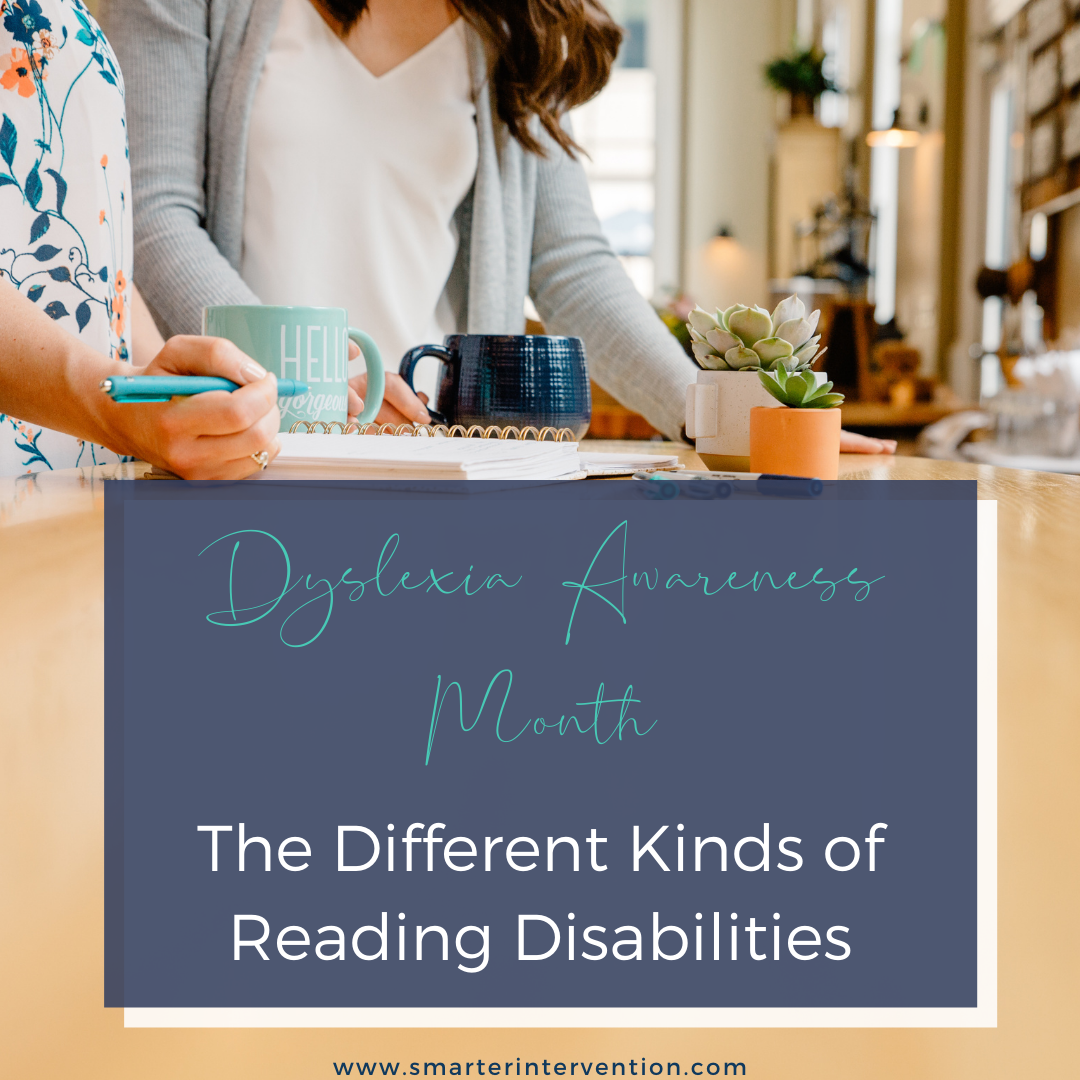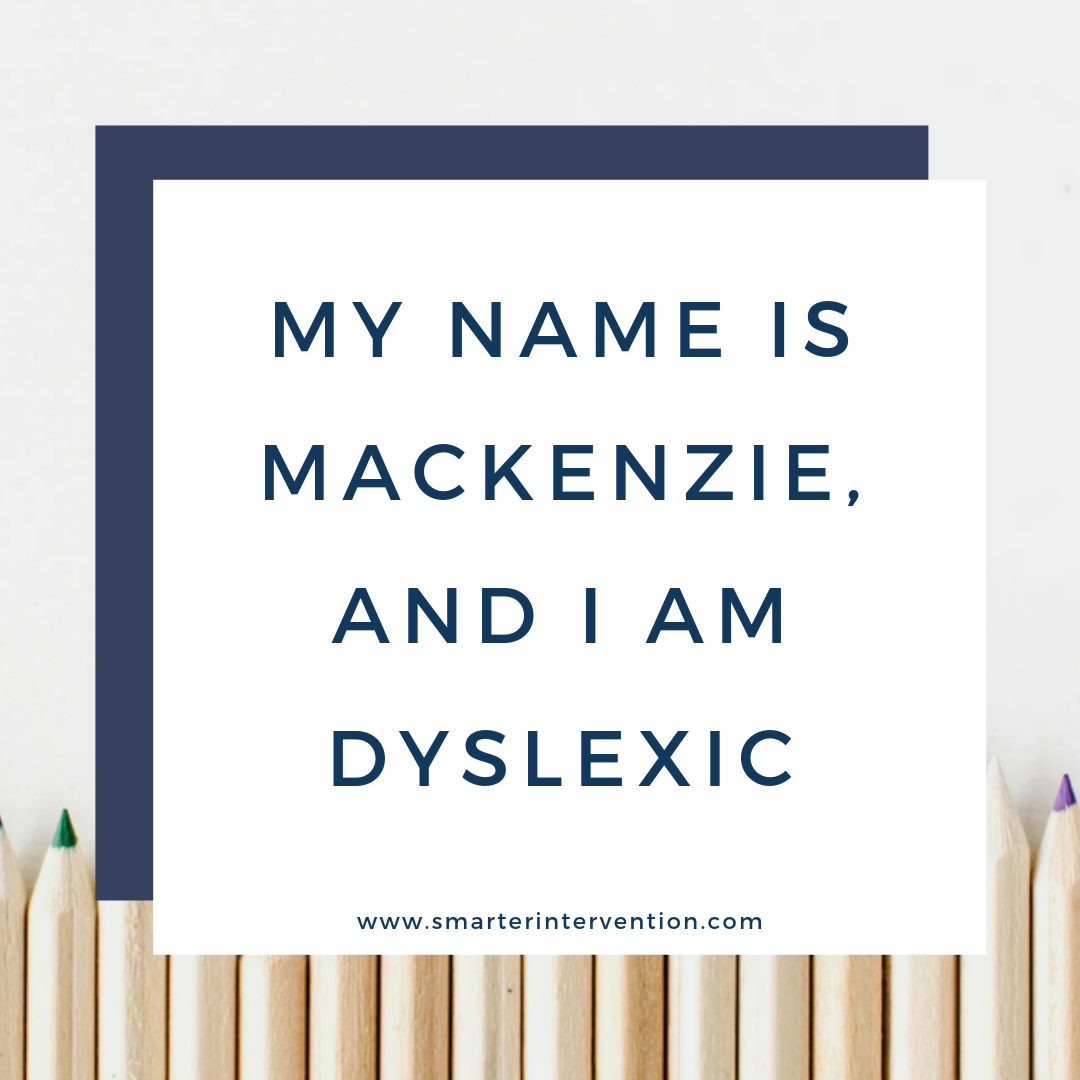Science-based literacy resources and articles
for families, educators and schools
Search by Category:
Categories
- Advocacy
- Authentic Literature
- Business
- Comprehension
- Data Tracking
- Differentiation
- Dyslexia
- Evaluation and Assessment
- Executive Functioning
- Games & Activities
- Helping My Child At Home
- How To
- IEP/504 Plan
- Lesson Planning
- Math
- Online Intervention
- Organization
- Parents
- Phonics
- Phonological Awareness
- Reading Comprehension
- Reading Fluency
- Research
- SLP
- Spelling
- Vocabulary
- Writing
Dyslexia & Co-Occurring Difficulties
We wanted to take this conversation a step further and dig into some common co-occurring struggles we see in our students with dyslexia. Specifically language, attention, mathematics, and social-emotional difficulties.
So let’s dive in!
The Different Kinds of Reading Disabilities
Many students struggle to learn how to read effectively or efficiently.
RESEARCH INDICATES THAT THERE ARE THREE DIFFERENT TYPES OF READING DISABILITIES.
These three types of disabilities relate to (if you know us…you’re probably guessing it right now!!!)
YEP…..
The Literacy Processing Triangle
Which Assessments Should Be Used to Diagnose Dyslexia?
The process of diagnosing dyslexia can often feel like this huge mysterious task! It is truly this multiple step challenge for parents, educators, medical professionals, and other professionals working with struggling students. Let’s break this down.
4 Common Myths about Dyslexia
In honor of dyslexia awareness month, we wanted to take this opportunity to dispel some common myths about dyslexia and to provide further information to go check out if you’re worried your child or one of your students may have dyslexia.
Let’s dive right in…
How Can SLPs Support Students with Dyslexia?
Literacy intervention, specifically for students with dyslexia causes this interesting conversation around who best supports this type of intervention? Traditionally literacy specialists and special educators have been the ones tasked with supported reading disabilities, I mean…it makes sense it’s an academic issue right?
The challenge is that dyslexia is a language-based learning disability. It’s often really a continuum of an oral language disability that transcended into the world of written language. This is a challenge for literacy specialists and special educators who don’t have a background in supporting oral language problems. And really - literacy specialists and special educators generally don’t have a background in supporting oral language struggles because that is an SLPs bread and butter.
So what this means is that….
Dyslexia Symptoms Checklist
Happy Friday, Everyone! We absolutely can not believe that October is already over. Holy moly! With October coming to a close, that means we are also finishing up with Dyslexia Awareness month. Our team was lucky enough to get to travel to the International Dyslexia Association’s National Conference last week - which was AMAZING.
My Name is Mackenzie, and I am Dyslexic.
My name is Mackenzie, and I am dyslexic.
Some of my earliest memories of school are feelings of frustration, confusion, sadness, and feeling lonely. Another memory that still makes my stomach hurt today is trying to memorize math facts. I have a great memory for some things; song lyrics, things people say, and pictures. But, remembering letters and numbers is a totally different story.
Suspect Dyslexia? The Time to Talk to Parents is Now!
Prepare your students for summer with strategies to combat the dreaded "summer slide" and prevent learning loss. Learn how to identify signs of dyslexia and guide families toward appropriate testing and intervention to ensure a successful new school year.
Is Ear Reading Really a Thing?
A hallmark of dyslexia is an inconsistency between a child’s reading level and oral language level. Often, dyslexic students are highly verbal; talkative, inquisitive, articulate, and have amazing vocabularies!
One of my all-time favorite students who happened to be dyslexic had the most amazing vocabulary as a young student, he still does today! He would hear a new word used in the context of a book or adult conversation and immediately add it to his repertoire.
5 Clues Your Student May Need a Different Approach to Reading
Identify struggling readers in your classroom with these 5 tips. Discover signs like slow reading, word substitution, and difficulty applying spelling rules. Download our mini-assessment to pinpoint students who may need a different learning approach. Act now to support your students effectively.
Everything Was Fine Until 3rd Grade
A common theme that we hear from many of the parents we work with is, “everything was fine until third grade.”
Parents often wonder, what happened!? My child wasn’t struggling in class, the teacher didn’t express any concerns, their reading was on grade-level or close to it, and then suddenly in third grade everything fell apart. What happened!?
5 Things Every Child with Dyslexia Needs in the Classroom
Students with dyslexia need to be taught in the way that their brains learn best. As teachers, it is our responsibility to learn how to meet the needs of this unique and special learning style. Research tells us that people with dyslexia often have average to above-average IQ’s.
The reason that they struggle in the school setting is not that they lack the intelligence it’s because people with dyslexia learn differently.
4 Things Every Teacher Needs to Know About Dyslexia
There are many misconceptions around dyslexia and unfortunately teachers went through a lot of training in college through their teacher training programs and yet still never received formal instruction in specific learning disabilities. We are here to dispel many popular misconceptions and we have a free printable!
She'll Catch Up
“Oh, she’ll catch up,” is what Jane recalled her daughter Susan’s teachers saying throughout first and second grades. Susan, now 12, was in the lowest reading group in her classroom but teachers assured Jane that Susan was very bright and would catch up shortly.
In truth, Susan wasn’t catching up. As peers began moving past her in reading, Jane became more anxious and worried.
My Child is Struggling, But Everyone Says He is On Grade-Level...
Is your child in the gray area?
“She has trouble spelling and reading fluently, but she’s doing okay for the most part
“He’s about a year behind, but don’t worry, it will click soon…”
“She has a hard time with reading grade level text, but she is fine compared to other kids in her class who struggle so much more…”
“I understand he has a diagnosis of dyslexia, but he’s not that far behind…”
8 Tips For Talking To Your Child About Dyslexia
Talking to your child about dyslexia can be anxiety-provoking. On the one hand you want them to understand why learning has been so difficult but on the other hand - you don't want to worry them or have them think anything is wrong. Using these 8 tips you will be well on your way to empowering your child to understand more about dyslexia.
Why SLPs are Uniquely Qualified to Support Students with Dyslexia
Discover why Speech-Language Pathologists (SLPs) are ideal for dyslexia support! Explore how SLPs excel in phonology, sound-symbol knowledge, morphology, syntax, and semantics—essential elements of strong reading intervention. Join the team in empowering struggling readers!
Is it dyslexia or a vision issue?
Dyslexia is a brain-based learning difference. It is a language processing disorder and not a vision or eye problem. In contrast to dyslexia specialists and most pediatricians, some optometrists may try to convince you that your child’s reading difficulties are due to vision problems and may recommend vision therapy or glasses. Some well-intentioned (but misinformed) therapists or teachers may even suggest colored overlays to “fix” the problem.



















